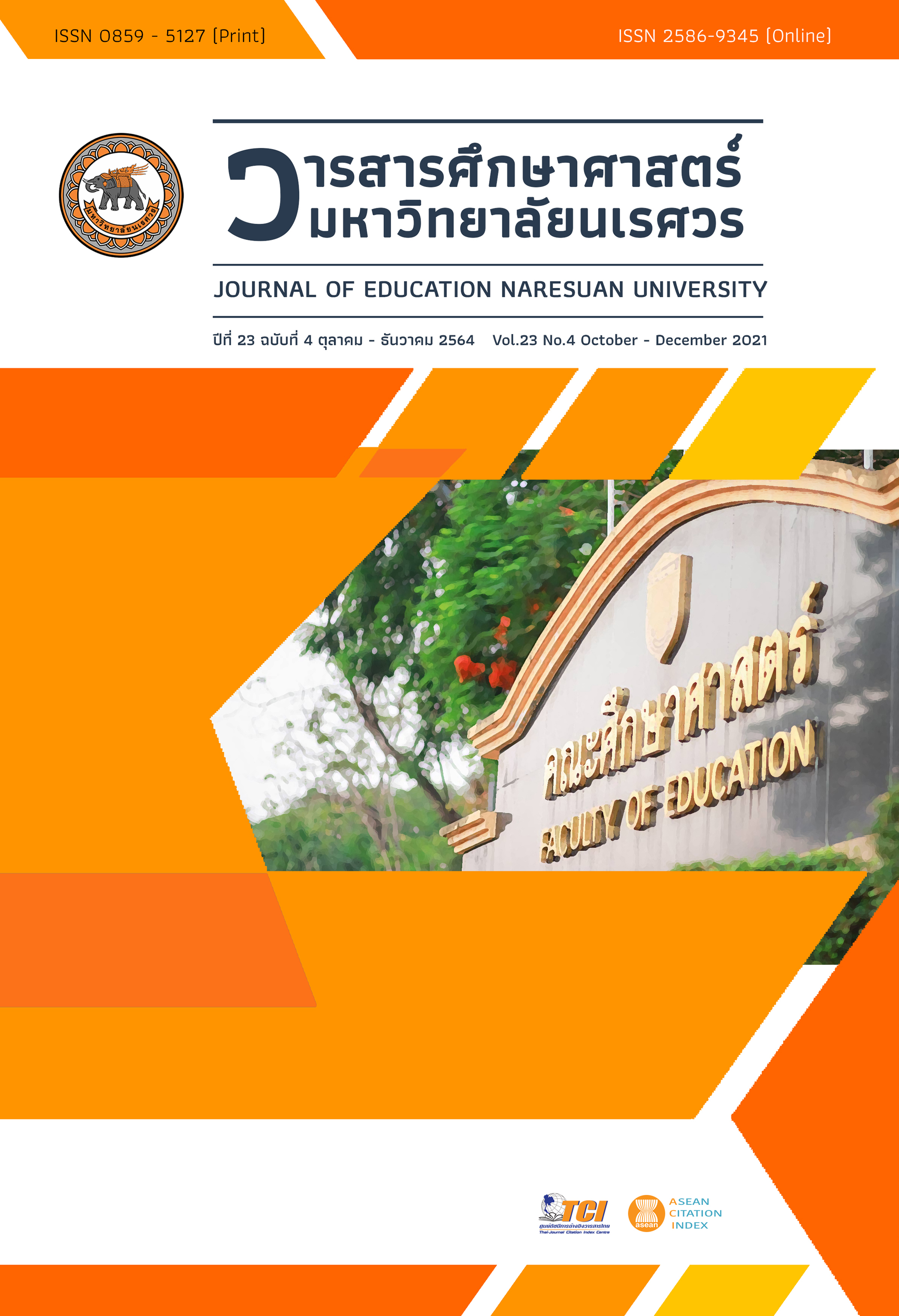A STUDY OF LEARNING ACHIEVEMENT AND SCIENTIFIC EXPLANATION ON PHOTOSYNTHESIS OF ELEVENTH GRADE STUDENTS USING INQUIRY-BASED INSTRUCTION (7E) WITH SCIENTIFIC EXPLANATION STRATEGY การศึกษาผลสัมฤทธิ์ทางการเรียนและการอธิบายเชิงวิทยาศาสตร์ เรื่อง การสังเคราะห์ด้วยแสง ของนักเรียนชั้นมัธยมศึกษาปีที่ 5 โดยใช้การจัดการเรียนรู้แบบสืบเสาะหาความรู้ 7 ขั้น (7E) ร่วมกับกลยุทธ์การอธิบายเชิงวิทยาศาสตร์
Main Article Content
Abstract
The purposes of this research were to compare learning achievement and scientific explanation using the Inquiry-based instruction (7E) with scientific explanation strategy and compare learning achievement and scientific explanation using the Inquiry-based instruction with scientific explanation strategy and the traditional teaching approach. The sample consisted of 80 eleventh grade students in 2 classes, using cluster sampling. The research instruments consisted of Inquiry-based instruction (7E) with scientific explanation strategy lesson plans, traditional teaching approach lesson plans, learning achievement test and scientific explanation test. The data were analyzed by t – test. The results of the study were
1. The learning achievement and the scientific explanation of the students after learned using the Inquiry-based instruction (7E) with scientific explanation strategy were higher than before learning at the .05 level of significance (t = 29.436, p = .000 and t = 37.948, p = .000 respectively).
2. The learning achievement and the scientific explanation of the students after learned using the Inquiry-based instruction (7E) with scientific explanation strategy were higher than that of the students learned using the traditional teaching approach at the .05 level of significance. (t = 8.158, p = .000 and t = 15.306, p = .000 respectively).
Article Details
The owner of the article does not copy or violate any of its copyright. If any copyright infringement occurs or prosecution, in any case, the Editorial Board is not involved in all the rights to the owner of the article to be performed.
References
Anegasukha, S. (2016). Educational research (8th ed.). Chonburi: Faculty of Education, Burapha University. [in Thai]
Anuworrachai, S. (2014). Science learning management by using the scientific explanation. STOU Education Journal, 7(2), 1-14. [in Thai]
Bayer, C. J., & Davis, E. A. (2008). Fostering second graders’ scientific explanations: A beginning elementary teacher’s knowledge, beliefs, and practice. The Journal of the Learning Sciences, 17(3), 381-414.
Eisenkraft, A. (2003). Expanding the 5E Model. Science Teacher, 70(6), 56-59.
Institute for the Promotion of Teaching Science and Technology (IPST). (2002). Standard of science and technology teacher. Bangkok: Institute for the Promotion of Teaching Science and Technology. [in Thai]
Institute for the Promotion of Teaching Science and Technology (IPST). (2016). Results of the study PISA 2015. Bangkok: Institute for the Promotion of Teaching Science and Technology. [in Thai]
Klainin, S., Dechsri, P., & Pramojaney, A. (2008). Knowledge and scientific performance for tomorrow's world. Bangkok: Seven Printing Group. [in Thai]
Kraipoom, N. (2018). A comparison of grade 7th students learning achievement analytical thinking and retention on circulatory system by 7e inquiry cycle with concept mapping and conventional learning (Master thesis). Chonburi: Burapha University, Chonburi. [in Thai]
Ladachart, L. (2012). Exploring and developing tenth-grade students’ understandings of nature of science. Princess of Naradhiwas University Journal, 4(2), 73-90. [in Thai]
Laopaiboon, B. (1999). Science teaching. Bangkok: Thai Watana Panich Press. [in Thai]
McNeill, K. L., & Krajcik, J. S. (2006). Supporting students construction of scientific explanation through generic versus context-specific written scaffolds. Paper presented at the annual meeting of the American Educational Research Association, San Francisco.
McNeill , K. L., & Krajcik, J. S. (2008). Inquiry and scientific explanations: Helping students use evidence and reasoning. In J. Luft, R. L. Bell, & J. Gess-Newsome, Science as Inquiry in the Secondary Setting (pp. 121-134). Virginia: NSTA Press.
McNeill , K. L., Lizotte, D. J., Krajcik, J., & Marx, R. W. (2006). Supporting students’ construction of scientific explanation through generic versus context-specific written scaffolds in instructional materials. The Journal of the Learning Sciences, 15(2), 153-191. DOI: 10.1207/s15327809jls1502_1
Meela, P., & Artdej, R. (2017). Model based inquiry and scientific explanation: Promoting meaning-making in classroom. Journal of Education Naresuan University, 19(3), 1-15. [in Thai]
Ministry of Education. (2009). The basic education core curriculum B.E. 2551 (A.D. 2008). Bangkok: The Agricultural Cooperative Federation of Thailand. [in Thai]
Musikul, K. (2007). Methods for teaching scientific inquiry. IPST Magazine, 149(35), 36-38. [in Thai]
Nuangchalerm, P. (2015). Learning science in the 21st century. Bangkok: Chula Press. [in Thai]
Office of the Basic Education Commission (OBEC). (2016). Quality assessment report, academic year 2015: Policy brief and recommendations. Bangkok: The Agricultural Cooperative Federation of Thailand. [in Thai]
Sricharun, S., Tuntiwaranuruk, C., & Sirisawad, C. (2017). The effect of inquiry cycle learning (7E) with higher order question on rational thinking and learning achievement in the topic “digestive system” of grade 10 students. Journal of Education Naresuan University, 19(2), 83-94. [in Thai]


